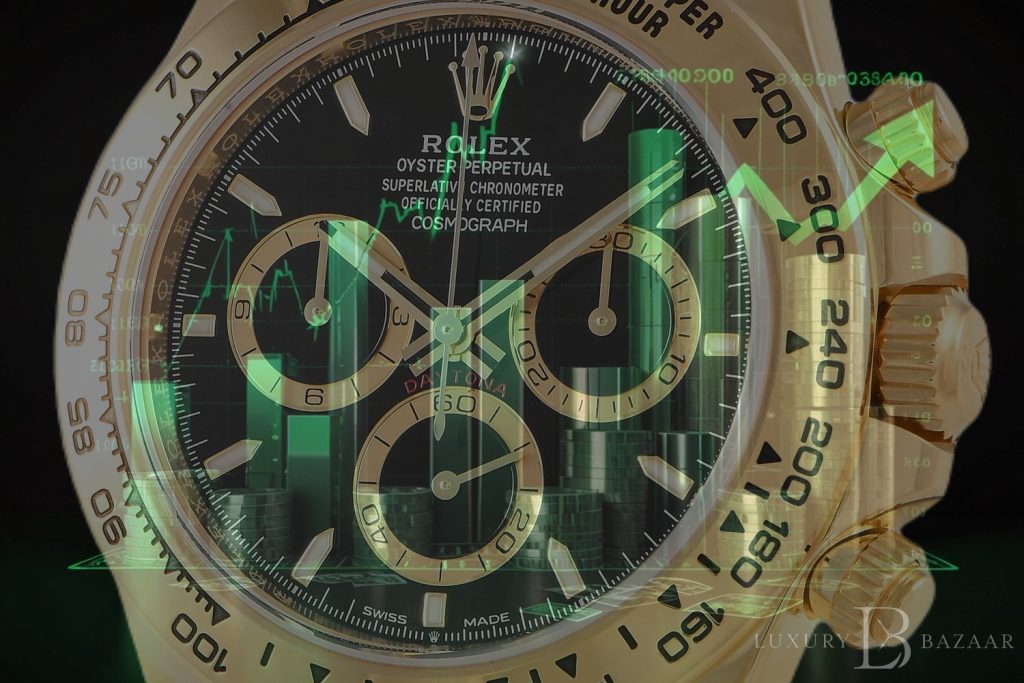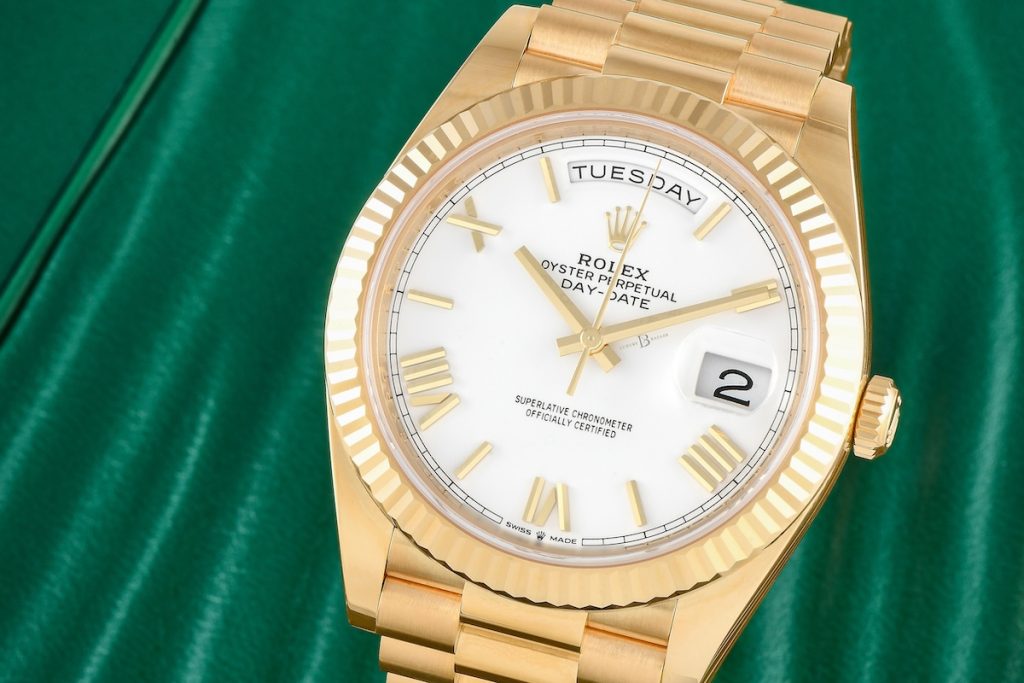Rolex 2025 Price Increases: Another Hike in Effect as of May 1
The Rolex 2025 price increases that rolled out in January were relatively modest (around 1%) for most steel models. The basic steel Submariner increased by $100, for instance. Most two-tone models went up by about 5%, while full gold models saw the biggest increases. And the entire Daytona line got steeper hikes than the rest of the catalog, with gold Daytonas climbing as much $7,500. Rolex again increased prices in United States on May 1st, this time by approximately 3% pretty much across the board, following the news of tariffs and increasing gold prices. Here’s our quick guide to the two 2025 Rolex price increases we’ve seen so far.

2025 Rolex Price Increase Chart
| Material | May 2025 US-Only Price Increase | Jan 2025 Price Increase (Non-Daytona) | Jan 2025 Price Increase (Daytona) |
|---|---|---|---|
| Stainless Steel or Rolesium | 3% | 1% | 2.6% |
| Platinum | 1% | 1% | 1% |
| White Rolesor (Steel with White Gold bezel) | 3% | 2% | N/A |
| Yellow/Everose Rolesor (Two-tone) | 3% | 5-9% | 6% |
| Solid 18k Gold | 3% | 7% | 13.4%-19% |

When Does Rolex Increase Prices?
Rolex usually increases prices on January 1 but now we’re on schedule to see another price hike on May 1, 2025. There’s a common perception that they raise prices every year, but that’s actually not true. The years 2013-2019 saw no price increases in the US, for example.
Rolex seems to treat US dollars and Swiss francs as their reserve currencies; those are the currencies least likely to see increases. If a currency has devalued relative to CHF or USD in a given year, then you can expect to see the prices reflect that the following January 1. And if the devaluation is too severe, they’ll even do mid-year currency-specific price increases, as they did in Australia on July 1, 2025. There was a second round of 2024 Rolex price increases in June of that year, too. So the USA-only May 2025 Rolex price increase wasn’t totally unprecedented.
Current Prices of Popular Models
| Rolex Model | May 2025 List Price (+~3%) | Jan 2025 List Price | 2024 List Price |
|---|---|---|---|
| Steel Submariner 124060 | $9,500 | $9,200 | $9,100 |
| Steel Submariner Date 126610 LN | $10,650 | $10,400 | $10,250 |
| Steel Submariner Date 126610 LV “Starbucks” | $11,200 | $10,900 | $10,650 |
| Two-Tone Submariner Date 126613 | $17,600 | $17,000 | $15,600 |
| Steel GMT-Master II 126710 on Oyster | $11,100 | $10,800 | $10,700 |
| Steel Datejust 36 with fluted bezel on Jubilee | $9,550 | $9,250 | $8,950 |
| Steel Datejust 36 with domed bezel on Oyster | $7,750 | $7,550 | $7,450 |
| Steel Datejust 41 with fluted bezel on Jubilee | $11,100 | $10,800 | $10,500 |
| Steel Datejust 41 with domed bezel on Oyster | $8,500 | $8,150 | $8,050 |
| Rose Gold or White Gold Daytona on Oysterflex | $39,300 | $38,100 | $32,100 |
| Yellow Gold Daytona on Oyster | $48,400 | $47,000 | $39,500 |
| Air-King 126900 | $7,750 | $7,550 | $7,450 |
| Steel Sky-Dweller 336934 | $16,800 | $16,400 | $15,900 |
| Yellow Gold Day-Date 36 | $40,200 | $39,000 | $35,000 |
| Rose Gold or White Gold Day-Date 36 | $43,500 | $42,300 | $37,900 |
| Yellow Gold Day-Date 40 | $44,200 | $43,000 | $38,500 |
| Rose Gold or White Gold Day-Date 40 | $47,500 | $46,300 | $41,500 |
| Platinum Day-Date 36 | $60,100 | $59,600 | $58,900 |
| Platinum Day-Date 40 | $64,600 | $64,000 | $63,300 |
Note that platinum models only went up by 1%, while steel (well, “White Rolesor”) Sky-Dwellers only got increased by 2.44% in the second increase of 2025. The cheapest Datejust 41 climbed by 4.3%. Everything else was right around 3%.
Why Did Rolex Daytona Prices Increase More in 2025?
Well, it’s no secret that the Rolex Daytona is their hardest-to-get line of watches. Increasing price is one way to reduce excess demand. In January 2025, percentage-wise, Rolex Daytona prices increased the most for yellow gold models, with 19% hikes for both Oysterflex and bracelet models. It seems Rolex is simply trying to capture as much profit as they can, and their increases are actually somewhat in line with market demand.
Now, with the 3% increase on May 1st, these Rolex chronographs have become even more expensive.
More on Rolex:

Rolex 2025 Price Increases: The Gold Factor
Although Rolex operates their own foundries, they’re not totally immune to rising gold market prices. Some people are under the impression that the price of gold should be insignificant when it comes to a Rolex, thinking they don’t contain very much gold, but in fact a Rolex Day-Date 40 contains about 4 troy ounces of pure gold.

That gold alone is worth over $10,000 today. Those same 4 ounces of gold cost less than $5,000 when the Day-Date 40 debuted at Baselworld 2015.
Smaller Margins for ADs
According to WatchPro, Rolex authorized dealers have also been notified that they will have to give up 1% of their margin, which will bring it down to 33% on every new Rolex watch sold. This approach is no doubt in response to the Trump tariffs, which were then temporarily paused.
Two-Tone Still Strong
It’s worth noting that while Rolex resale prices generally fell in 2024, the market price for two-tone models actually went up slightly. This seems to signal a continuing trend of two-tone watches being back in style. And the Rolex 2025 price increases put the MSRP of a two-tone Sub right around its fair market value of $17,000. Although demand for many steel Rolex sports models greatly exceeds supply, you shouldn’t have to spend too long on a Rolex waitlist for a two-tone.

Rolex Output
Rolex gets lots of accusations of “artificial scarcity” thrown at them, but all the evidence I see points the other way: that the Rolex supply chain is at or near capacity and doing everything they can to increase supply, while maximizing the profit on all of the units they can produce. They make more money putting a 3235 movement in a gem-set two-tone Datejust than a steel Sub Date. And some of the most expensive Rolex watches made in recent years are gem-covered off-catalog models that make it seem like the brand is trying to move upscale.
Rolex’s annual production of about 1.25 million watches puts them head and shoulders above all the other top luxury watch brands in terms of output. That’s 2.4 watches per minute, and these are watches that customers expect to be flawless. So why not just increase the MSRP of steel sports models to capture more profit that way, as there is plenty of excess demand for those?
Well, there’s the fact that Rolex is currently building three new factories (with the biggest one expected to be online by 2029) and has opened several watchmaking schools around the world. They even offered tuition-free 18-month courses in Dallas because they want more watchmakers so badly. I expect steel Rolex output to significantly increase within the next few years, and if they jack up the list price too much now, they’d have to decrease it later. And as we saw with Audemars Piguet in 2012, luxury brands decreasing MSRP is bad for business. Rolex is always thinking long-term.






Leave a Reply